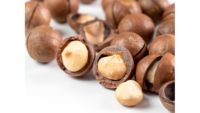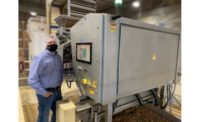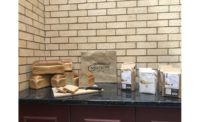Case Study: Tomra 5C gives hazelnut producer a competitive advantage targeting high-quality export markets

 Gürsoy has been producing and selling hazelnuts since 1933 and is today one of Turkey's top 10 hazelnut exporters. With its three facilities in Ordu on the Black Sea coast, Gürsoy is recognized in international markets as one of the most established producers in its region of hazelnuts and hazelnut side products. Exporting to 32 countries worldwide, Gürsoy supplies natural and processed hazelnut products to large industrial companies that operate at the top level. Gürsoy continuously invests in its facilities to ensure the quality meets customers' demands, and it is at the forefront of automation with its purchases of TOMRA optical sorters. It has chosen the new TOMRA 5C, featuring the latest technologies, to further increase the quality of its products. Gürsoy is the first company in Turkey to use this optical sorter in processing hazelnuts.
Gürsoy has been producing and selling hazelnuts since 1933 and is today one of Turkey's top 10 hazelnut exporters. With its three facilities in Ordu on the Black Sea coast, Gürsoy is recognized in international markets as one of the most established producers in its region of hazelnuts and hazelnut side products. Exporting to 32 countries worldwide, Gürsoy supplies natural and processed hazelnut products to large industrial companies that operate at the top level. Gürsoy continuously invests in its facilities to ensure the quality meets customers' demands, and it is at the forefront of automation with its purchases of TOMRA optical sorters. It has chosen the new TOMRA 5C, featuring the latest technologies, to further increase the quality of its products. Gürsoy is the first company in Turkey to use this optical sorter in processing hazelnuts.
Gürsoy produces natural hazelnuts and various processed hazelnuts for industrial use, cream types with cocoa or milk, hazelnut spread, dragée, various packaged hazelnuts, sauces, and chocolate for the domestic and export retail industry. Gürsoy has been using TOMRA machines in its facilities since the early 2000s. Six TOMRA machines are operating on the production lines of its three facilities in Ordu.
Dursun Oğuz Gürsoy, chairman of Gürsoy, said: "Although our production volume varies from year to year due to yield and export conditions, our sales volume ranges from 10,000 to 14,000 tons of hazelnut kernels. To achieve this capacity, we benefit from the advantages of the TOMRA machines. These are usually on the natural hazelnut line because if the raw material is sorted well, you do not need to sort the product again after processing. We also have TOMRA optical sorters on the processed hazelnut lines. As we are happy with our partnership with TOMRA, which dates back over 20 years, we decided to invest in their newest machines and use the TOMRA 5C for the first time for sorting hazelnuts."
Dursun Gürsoy explained that Turkey exports hazelnuts mainly to Germany and Italy, as well as other EU countries such as France, Poland and Austria. He commented: "To meet the high expectations of European markets, we manage the production process meticulously. Therefore, the investments in automation that we and our customers trust become more significant. Above all, we trust the organizational structure and the continuity of TOMRA. The high productivity and success in achieving quality products with TOMRA's solutions adds value to our processing operations. On the other hand, everybody knows that optical sorters reduce operational costs. Firstly the reduction in labor costs, then the advantages of high sorting capacities, and the ease of sorting the defects that are impossible to detect through visual inspections made by workers—these factors all reduce operational costs."
On the subject of exporting, Gürsoy explained: "Turkey supplies 65-70 percent of hazelnuts in the world every year. Although Italy, the US, Azerbaijan, Georgia, Chile, and Spain are also top producers, Turkey leads the way globally in terms of volume and quality. In 2020, Turkey exported 280,924 tons of hazelnut kernels for a value of $1.9 billion. Year-on-year hazelnut exports decreased by 12 percent and year-on-year foreign currency exports by 4 percent due to the downturn in export markets caused by the pandemic. The pandemic has hit the domestic market harder, with demand decreasing by 15 percent. However, in 2021, the strict measures and vaccination campaigns in the European countries will positively affect the markets for the June-December period, which will accelerate the positive trend in consumption. So, we think hazelnut producers should keep investing in their facilities."
As the leading hazelnut producer, Turkey needs to increase investment in automation
The pandemic has brought to the fore once again the importance of automation and optical sorting solutions in the food industry. The rapid increase of labor costs, the added costs of the measures necessary to protect workers in and out of the facility, as well as the costs relating to the loss of labor, are all factors that highlight the importance of automation and mechanization.
Dursun Gürsoy explained, "Although Turkey started using optical sorting solutions about 10-15 years ago, the use of these machines is still not sufficient. The rapid increase in financing costs makes it impossible for small- and mid-sized companies to invest. Large-scale companies strive to equip their facilities with optical sorting systems in accordance with their financial capabilities. However, the high finance charges and the downward trend of profit margins due to strong competition in the hazelnut sector are slowing down investments in optical sorters. The percentage of optical sorting systems in small- and medium-sized companies is below 5 percent, and despite widespread use of these systems in large-sized companies, it is still below 50 percent. But I believe that the negative effects of this pandemic will accelerate decisions to invest."
Gürsoy stated that using TOMRA machines has dramatically decreased the number of complaints about foreign materials and added, "While reducing labor costs, we increased our production capacity. Also, fast maintenance service, spare part service, and high machine performance are among the most important advantages of TOMRA. The return on investment for the optical sorters has improved because of all these advantages."
Gürsoy thoroughly researched the market before deciding to purchase the new TOMRA 5C: "We analyzed different optical sorter solutions. The main factors in preferring the TOMRA 5C were its sorting performance, capacity, and ability to detect the defects which other machines would miss, and our previous experience with TOMRA machines in the past years."
TOMRA Food Turkey Sales Manager Ahmet Koçyiğit said: "The TOMRA 5C premium optical sorter combines industry-leading sensors with machine learning and big-data analysis to ensure the most accurate foreign material removal possible. High-resolution lasers and the latest generation sensors help the TOMRA 5C detect and analyze the smallest defects, which are impossible to scan with other machines. With this sorter, we address the biggest challenges of the nut and dried fruit industry, such as labor, food safety and product quality. Gürsoy will be the first hazelnut processor in Turkey to use this special machine thanks to its approach being always open to improvement."
About TOMRA Food
TOMRA Food designs and manufactures sensor-based sorting machines and integrated post-harvest solutions for the food industry, using the world’s most advanced grading, sorting, peeling and analytical technology. Over 8,000 units are installed at food growers, packers and processors around the world for fruits, nuts, vegetables, potato products, grains and seeds, dried fruit, meat, and seafood. The company’s mission is to enable its customers to improve returns, gain operational efficiencies, and ensure a safe food supply via smart, useable technologies. To achieve this, TOMRA Food operates centers of excellence, regional offices and manufacturing locations within the United States, Europe, South America, Asia, Africa, and Australasia.
TOMRA Food is a member of the TOMRA Group that was founded in 1972 that began with the design, manufacture and sale of reverse vending machines (RVMs) for automated collection of used beverage containers. Today TOMRA provides technology-led solutions that enable the circular economy with advanced collection and sorting systems that optimize resource recovery and minimize waste in the food, recycling and mining industries.
TOMRA has 100,000 installations in over 80 markets worldwide and had total revenues of 9.9 billion NOK in 2020. The Group employs 4,300 globally and is publicly listed on the Oslo Stock Exchange (OSE: TOM). For further information about TOMRA, please see www.tomra.com.
Looking for a reprint of this article?
From high-res PDFs to custom plaques, order your copy today!





